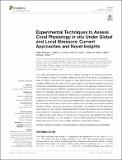Files in this item
Experimental techniques to assess coral physiology in situ under global and local stressors : current approaches and novel insights
Item metadata
| dc.contributor.author | Dellisanti, Walter | |
| dc.contributor.author | Chung, Jeffery T. H. | |
| dc.contributor.author | Chow, Cher F. Y. | |
| dc.contributor.author | Wu, Jiajun | |
| dc.contributor.author | Wells, Mark L. | |
| dc.contributor.author | Chan, Leo L. | |
| dc.date.accessioned | 2021-06-17T11:30:02Z | |
| dc.date.available | 2021-06-17T11:30:02Z | |
| dc.date.issued | 2021-06-07 | |
| dc.identifier | 274676243 | |
| dc.identifier | d3cfe33e-0413-443b-980c-7479681d7619 | |
| dc.identifier | 000663634100001 | |
| dc.identifier | 85108376819 | |
| dc.identifier.citation | Dellisanti , W , Chung , J T H , Chow , C F Y , Wu , J , Wells , M L & Chan , L L 2021 , ' Experimental techniques to assess coral physiology in situ under global and local stressors : current approaches and novel insights ' , Frontiers in Physiology , vol. 12 , 656562 . https://doi.org/10.3389/fphys.2021.656562 | en |
| dc.identifier.issn | 1664-042X | |
| dc.identifier.other | crossref: 10.3389/fphys.2021.656562 | |
| dc.identifier.other | ORCID: /0000-0002-1020-8409/work/100549797 | |
| dc.identifier.uri | https://hdl.handle.net/10023/23376 | |
| dc.description | This study was supported by the Hong Kong Branch of Southern Marine Science and Engineering Guangdong Laboratory (Guangzhou; SMSEGL20SC02); the Collaborative Research Fund (C7013-19G) of the Hong Kong Research Grants Council; the National Natural Science Foundation of China (41641047); the Internal Research Project of State Key Laboratory of Satellite Ocean Environment Dynamics, Second Institute of Oceanography, State Oceanic Administration (no. SOEDZZ1702); and the SKLMP Seed Collaborative Research Fund (SCRF/0027). | en |
| dc.description.abstract | Coral reefs are declining worldwide due to global changes in the marine environment. The increasing frequency of massive bleaching events in the tropics is highlighting the need to better understand the stages of coral physiological responses to extreme conditions. Moreover, like many other coastal regions, coral reef ecosystems are facing additional localized anthropogenic stressors such as nutrient loading, increased turbidity, and coastal development. Different strategies have been developed to measure the health status of a damaged reef, ranging from the resolution of individual polyps to the entire coral community, but techniques for measuring coral physiology in situ are not yet widely implemented. For instance, while there are many studies of the coral holobiont response in single or limited-number multiple stressor experiments, they provide only partial insights into metabolic performance under more complex and temporally and spatially variable natural conditions. Here, we discuss the current status of coral reefs and their global and local stressors in the context of experimental techniques that measure core processes in coral metabolism (respiration, photosynthesis, and biocalcification) in situ, and their role in indicating the health status of colonies and communities. We highlight the need to improve the capability of in situ studies in order to better understand the resilience and stress response of corals under multiple global and local scale stressors. | |
| dc.format.extent | 17 | |
| dc.format.extent | 2543524 | |
| dc.language.iso | eng | |
| dc.relation.ispartof | Frontiers in Physiology | en |
| dc.subject | Environmental monitoring | en |
| dc.subject | Underwater respirometry | en |
| dc.subject | Fluorometry | en |
| dc.subject | Photobiology | en |
| dc.subject | Coral metabolism | en |
| dc.subject | GE Environmental Sciences | en |
| dc.subject | QH301 Biology | en |
| dc.subject | 3rd-DAS | en |
| dc.subject | SDG 14 - Life Below Water | en |
| dc.subject.lcc | GE | en |
| dc.subject.lcc | QH301 | en |
| dc.title | Experimental techniques to assess coral physiology in situ under global and local stressors : current approaches and novel insights | en |
| dc.type | Journal article | en |
| dc.contributor.institution | University of St Andrews. School of Biology | en |
| dc.identifier.doi | 10.3389/fphys.2021.656562 | |
| dc.description.status | Peer reviewed | en |
This item appears in the following Collection(s)
Items in the St Andrews Research Repository are protected by copyright, with all rights reserved, unless otherwise indicated.

